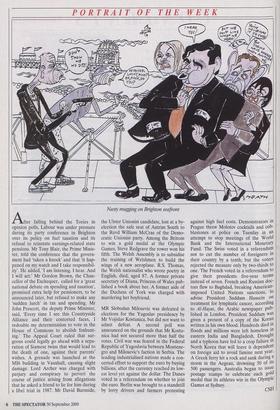PORTRAIT OF THE WEEK
Nasty mugging on Brighton seafront After falling behind the Tories in opinion polls, Labour was under pressure during its party conference in Brighton over its policy on fuel taxation and its refusal to reinstate earnings-related state pensions. Mr Tony Blair, the Prime Minis- ter, told the conference that the govern- ment had 'taken a knock' and that 'it hap- pened on my watch and I take responsibil- ity'. He added, `I am listening. I hear. And I will act.' Mr Gordon Brown, the Chan- cellor of the Exchequer, called for a 'great national debate on spending and taxation', promised extra help for pensioners, to be announced later, but refused to make any `sudden lurch' in tax and spending. Mr John Prescott, the deputy Prime Minister, said, 'Every time I see this Countryside Alliance and their contorted faces, I redouble my determination to vote in the House of Commons to abolish foxhunt- ing.' The Appeal Court ruled that sur- geons could legally go ahead with a sepa- ration of Siamese twins that would lead to the death of one, against their parents' wishes. A grenade was launched at the MI6 building in Vauxhall, causing slight damage. Lord Archer was charged with perjury and conspiracy to pervert the course of justice arising from allegations that he asked a friend to lie for him during a libel trial in 1987. Mr David Burnside, the Ulster Unionist candidate, lost at a by- election the safe seat of Antrim South to the Revd William McCrae of the Demo- cratic Unionist party. Among the Britons to win a gold medal at the Olympic Games, Steve Redgrave the rower won his fifth. The Welsh Assembly is to subsidise the training of Welshmen to build the wings of a new aeroplane. R.S. Thomas, the Welsh nationalist who wrote poetry in English, died, aged 87. A former private secretary of Diana, Princess of Wales pub- lished a book about her. A former aide of the Duchess of York was charged with murdering her boyfriend.
MR Slobodan Milosevic was defeated in elections for the Yugoslav presidency by Mr Vojislav Kostunica, but did not want to admit defeat. A second poll was announced on the grounds that Mr Kostu- nica had not secured more than half the votes. Civil war was feared in the Federal Republic of Yugoslavia between Montene- gro and Milosevic's faction in Serbia. The leading industrialised nations made a con- certed effort to support the euro by buying billions, after the currency reached its low- est level yet against the dollar. The Danes voted in a referendum on whether to join the euro. Berlin was brought to a standstill by lorry drivers and farmers protesting against high fuel costs. Demonstrators in Prague threw Molotov cocktails and cob- blestones at police on Tuesday in an attempt to stop meetings of the World Bank and the International Monetary Fund. The Swiss voted in a referendum not to cut the number of foreigners in their country by a tenth; but the voters rejected the measure only by two-thirds to one. The French voted in a referendum to give their presidents five-year terms instead of seven. French and Russian doc- tors flew to Baghdad, breaking American- imposed United Nations sanctions, to advise President Saddam Hussein on treatment for lymphatic cancer, according to Al-Hayat, the Arabic newspaper pub- lished in London. President Saddam was given a present of a copy of the Koran written in his own blood. Hundreds died in floods and millions were left homeless in eastern India and Bangladesh. Drought and a typhoon have led to a crop failure m North Korea that will leave it dependent on foreign aid to avoid famine next year. A Greek ferry hit a rock and sank during a storm in the Aegean, drowning 50 of its 500 passengers. Australia began to issue postage stamps to celebrate each gold medal that its athletes win in the Olympic Games at Sydney. CSH


























































































 Previous page
Previous page